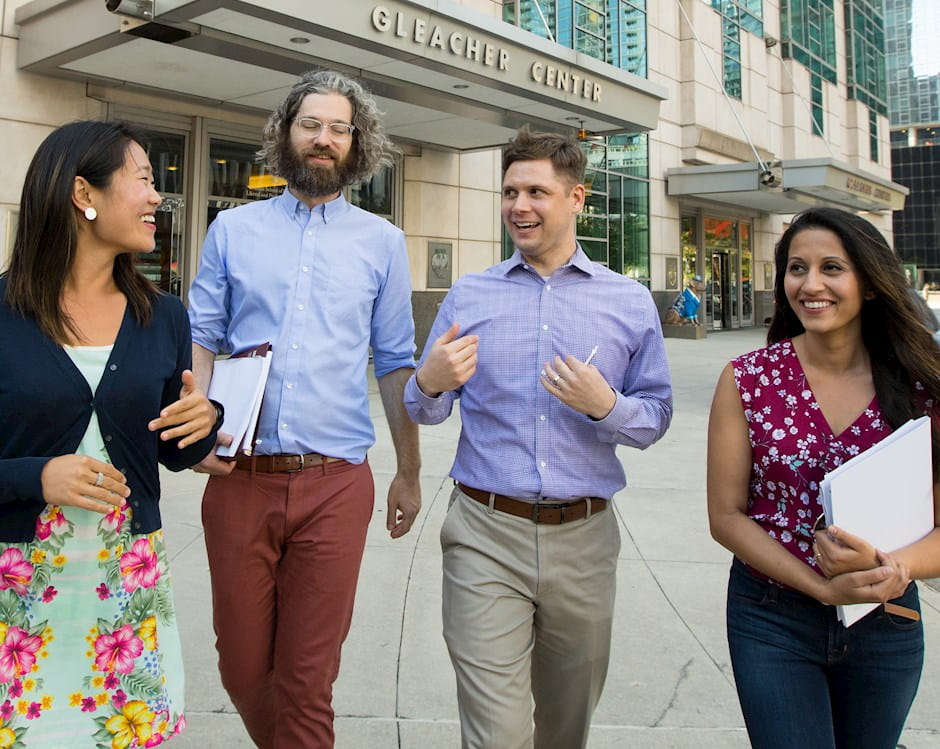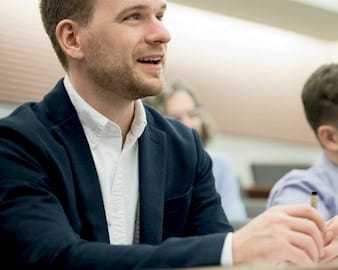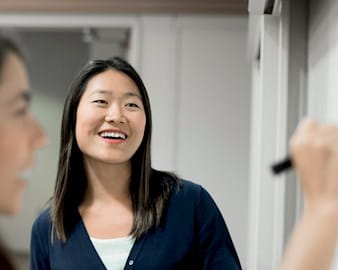“It can be very paralyzing to not have all the questions answered when you set out on a new initiative,” Morrissey said. “One of the big lessons was, just try some stuff. If it fails, you will foreclose some mistaken paths, and you’ll have learned a bunch of lessons. If it succeeds, you’ve gained a path forward validated by experience.”
It’s a lesson Morrissey has implemented at the Volcker Alliance, where he is now associate director, managing a project of building regional councils around the United States to bring together universities and government leaders to better recruit and train college students for public-service careers. The “fail-fast” mentality he learned in Lyman’s course has helped him adapt the program during COVID-19, which has forced a shift away from a model of in-person engagement and toward a looser network that gives more responsibility to the Alliance’s partners.
The growth of the Civic Scholars Program is part of a larger trend of corporations and business schools reexamining the role of business in society and the responsibility of companies to all their stakeholders. In 2019 the Business Roundtable, a group of 181 CEOs, publicly committed their corporations to delivering value to customers, investing in employees, dealing fairly and ethically with suppliers, supporting communities, and generating long-term value for shareholders. Investors and regulators have become more insistent that companies pay attention to environmental, social, and corporate governance issues. And in September 2020, Booth hosted a virtual conference convening 1,500 attendees in the United States, Europe, and Asia to hear from experts on corporate social responsibility in today’s business landscape.
At Booth Gertner has seen students become more willing to scrutinize the social implications of business decisions. When he started teaching competitive strategy in 1990, he said, no one would question whether it was acceptable to seek to maximize profits at all costs. “Now students will raise questions about that fairly reliably,” he said. “I think confronting the role of capitalism and the role of business in society is much more a part of the discussion across the board in the classroom, which I think is a good thing.”
While the scholars aren’t responsible for that change, they have helped to shift the dialogue. Their success as alumni advertises the fact that Booth students don’t fit only one mold. “The school has a bit of a reputation for being a very free-market, traditional-economics-focused place,” Gertner added. “That’s a part of who we are, but that’s not all we are. The program can play a role in the short run to change perceptions about the school, to better reflect the reality of what we teach and who our students are, the kind of research we do.”
In the long run, Gertner hopes the Civic Scholars Program helps Booth be recognized as “the top place for people who want to be leaders across all sectors, and one that takes a disciplined and rigorous approach to management and leadership across all domains.”
And these different career paths can intersect: Booth alumni in government or the nonprofit sector may collaborate with other alumni in the corporate world who sit on nonprofit boards, donate to charitable causes, or forge public-private partnerships. Neubauer Civic Scholars “don’t necessarily go into the program thinking of people in the private sector as allies, even though they’re naturally partners,” Wu said. “They learn to recognize many more partnership opportunities, and because they’ve gone through the program, they have credibility.”
Booth alumni who sit on nonprofit boards can help publicize the program by identifying people in the nonprofit organization who could benefit from earning a Booth MBA, Wu added.
Alumni such as Geraghty also help to build the reputation of the Civic Scholars. He’s preparing to move to Botswana to serve as the Peace Corps’s director of management and operations in that country, where he’ll oversee a team that will play a major role in bringing volunteers safely back to the country. As he plans this transition, he often thinks about what he learned early in the MBA program about being approachable, projecting warmly, and supporting others in working through problems.
“I’ve learned from Booth that connecting with people is front and center in getting things done,” he said. “The technical skills are important, too, and will help me make sure we’re getting the right things done.”
As the Neubauer Civic Scholars support one another in attaining their goals, they also hope to inspire classmates from outside their cohort to create social impact in their own careers, whether they stay in their current jobs or decide to move in a new direction.
“Whenever any Booth alumni get to the point in their career where they feel like they need a change, or that what they do is not sufficiently rewarding, they should consider public-service work,” Morrissey said. “There are a lot of amazing things in the incredible market economy we’ve built, but there is also a commons—and someone has to be minding the commons. Very genuinely, I think it can be an extraordinarily important and noble calling.”




